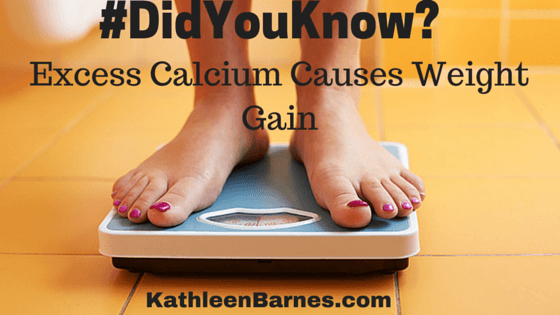Last Updated: 1/25/2019
NOTE FROM KATHLEEN: This is an excerpt of The Calcium Lie: What Your Doctor Still Doesn’t Know, which I wrote with Dr. Robert Thompson. The Calcium Lie 2: What Your Doctor Still Doesn’t Know. It contains some still unknown and vital information about our health concerns.
Part 1: Weight Issues
Are you overweight? Is someone you love overweight?
No doubt, your doctor has told you to eat less and exercise more while discreetly adjusting a lab coat to cover a personal paunch. Take a good look. Is your doctor an example of good health? If not, maybe you need a change.
It seems too simple. So you struggle. You faithfully get up at 5 a.m. every day for a morning jog. You try Atkins, South Beach, Jenny Craig and Weight Watchers. You gulp down chromium picolinate, 5-HTP, garcinia cambogia, hoodia, Alli, green coffee, dark chocolate, and every fad supplement. You’ve probably had some success, but for almost all of us, the success is temporary. The weight begins to creep back on until you’ve regained all you lost and then some.
Why is that? Are we all weak-willed, unable to resist the temptation of the dinner plate? Is our willpower so lacking that we can’t even do the basic exercise of pushing away from the dinner table?
No! This answer may surprise you, but we are turning into a fat nation (Generation XL) because we are quite literally starving. That’s right: In a time of unparalleled food wealth, we cannot get the nutrients our bodies need to function. Quite literally, our mineral deficiencies and imbalances, especially calcium excess, is leading us to metabolic failures of unprecedented proportions.
We know that sounds like an oxymoron, to be fat but starving, but if you add up what you’ve learned in the first four chapters of this book, it will all start to make sense.
What are we starving for? You guessed it: Minerals. What are we stuffed with? We’re sure you guessed it again: Calcium.
It’s a vicious circle: We are starving for the minerals we need, and so we are driven, through cravings to eat more and more food in an effort to get those minerals into our cells where they are essential for literally trillions of metabolic functions, but our foods are low in minerals because of our mineral-poor soil and because few are vine ripened. So we eat more and more. Our metabolisms are slowed because of calcium excess, adrenal suppression and thyroid hormone resistance (Type 2 hypothyroidism). Digestion is impaired; stomach acid is deficient or improperly released. Protein is not fully digested and essential amino acids are not absorbed. Amino acids can’t make it into our cells due to sodium/potassium membrane electrical potential failure. More cravings are stimulated by amino acid deficiencies and resulting neurotransmitter deficiencies.
It’s a terrible, uncontrollable, downward spiral. Since we all know the well-documented risks of being overweight, it all seems so sad to think that we are killing ourselves in a desperate struggle to get the nutrients we need to survive and all the while we are admonished to get our calcium, diet and exercise.
So how does this all work?
Knowing that almost every single American is mineral deficient, it isn’t a great leap of logic to think about deficiencies and imbalances in certain minerals causing cravings. Those cravings may be for sugary foods or they may be for salty foods or both.
Sugary food cravings probably mean you are becoming insulin resistant and entering into a state of unhealth called metabolic syndrome in which you have elevated insulin levels, high blood pressure, elevated total cholesterol and triglycerides, and obesity. This has sometimes been called “pre-diabetes” because, while your fasting blood sugars may still be within the normal range, you are almost inevitably headed toward full-blown and preventable Type 2 diabetes and all of its side effects, including heart disease, stroke, kidney failure, poor circulation leading to amputations, macular degeneration, retinal hemorrhages leading to blindness and the list goes on and on. Hypoglycemic episodes are actually caused by insulin resistance with hypersecretion of insulin and should also be considered a precursor to Diabetes Type 2 (Adult Onset). It is very important to reverse these trends, and just losing weight doesn’t treat the underlying problem which is subjecting huge numbers of people to what I call “the weight roller coaster.”
Salty food cravings may also be related to insulin resistance, but theses cravings along with cravings for fatty foods are even more directly linked to mineral deficiencies since so many minerals have a salty flavors, including of course, sodium.
Hmmm, salty, fatty food and sugar. . . a Quarter Pounder, fries and a Coke . . . No wonder McDonald’s raked in $22.8 billion worldwide in 2007. Add in all the other fast, fried and super-processed foods that are a regular part of our American diets and a pattern becomes clear.
Food cravings are basically a form of pica (which refers to an eating disorder that involves eating non-food items, most commonly dirt, clay, cornstarch, laundry starch, and baking soda) in an attempt to get more minerals into the body. You’ll probably be interested to know that as many at 68% of pregnant women develop some form of pica, but it is also fairly common among the rest of the population. This is interesting, since we know that each pregnancy drains 10% or more of a woman’s total body mineral supply, so “pica” is the body’s desperate attempt to replace those essential and missing minerals. Mineral supplementation with ionic sea-salt-derived minerals may, in fact, be the most important nutritional choice we can make before, during and after pregnancy especially if breast feeding (See Chapter 6). Iron supplementation is the most common treatment for pica, so the mainstream medical community seems to have gotten the idea that this eating disorder is the result of the human’s insatiable quest for iron for survival. But iron is not the only deficient mineral, and iron deficiency is typically only a symptom of a greater imbalance in the body’s mineral supplies, quite literally the tip of the iceberg. This imbalance is often exaggerated by calcium supplementation, especially in women whose intracellular calcium levels are already excessive.
We’re here to tell you that if you exercise like a hamster on the wheel and eat nothing but lettuce for the rest of your life to lose weight, it will cause no permanent changes unless you treat your underlying metabolic issues and imbalances by balancing and raising your mineral levels and supplementing correctly. All meaningful weight loss must involve treating and correcting the underlying metabolism. This is even more true for patients who have undergone weigh reduction bypass procedures that may further accentuate mineral, amino acid and other nutritional deficiencies and imbalances.
Low thyroid hormone levels are not the only cause of obesity, but over 95 percent of all obese patients in my practice have hypothyroidism, due to calcium excess with thyroid hormone resistance (type 2 hypothyroidism), and the resulting metabolic failures.








Well what mineral supplements should a 67 yr. Old female be taking? I have gained 50 lbs/yr. I am over 300 lbs. And desperate. Please answer
Sorry for the late response. I’ve been traveling. According to The Calcium Lie I wrote with Dr, Robert Thompson, almost everyone needs an ionic trace mineral supplement. I take a liquid one made by Trace Mineral Inc. It tastes nasty, but I just chug it down mixed with water. You can also get it in a capsule, no taste, but you have to take about 6 or 8 a day. I wish there was an easy answer to the weight issue, but there isn’t, that I know if. I do n=know that fat doesn’t make you fat, but sugar does. That, unfortunately doesn’t mean just avoiding sugar and sugar products, but all simple carbs, like pasta, bread, etc. It’s hard and I can’t pret4end to have complete success there. Let’s keep up this conversation.